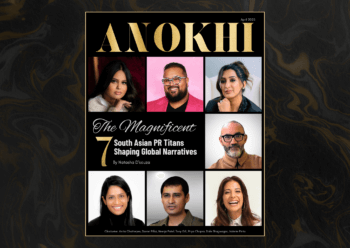Ritu Bhasin Wants You To #Resist Conformity In Her New Book ‘The Authenticity Principle’
Nov 20, 2017

Leadership coach and consultant Ritu Bhasin is refusing to conform and instead is living every day as her authentic self. In her first book, The Authenticity Principle, she explains why it’s important to #Resist.
“Years ago, I was invited to an event exclusively for women in leadership. I was excited to go — it was a great chance to network with accomplished women, be inspired, and spread the word about the work I was doing.” (Bhasin, R. (2o17). The Authenticity Principle. Toronto, ON: Melanine Made Press)
But Bhasin’s excitement quickly turned to fear as she realized the “who’s who” of the business women who were there. And not only was she younger than a lot of them, she was also one of the few women of colour. After a couple of awkward conversations, and witnessing a woman walk away from her upon seeing her name tag, Bhasin decided right then and there to fully embrace who she is, and to stop performing — the premise of her new book The Authenticity Principle.

Sounds complicated, but the concept is fairly simple, she explains, as it’s “a framework for resisting conformity, embracing differences, and transforming our lives,” adding that “when we consistently choose to […] be who we are [no matter how different] as often as possible, we feel better about ourselves.” And she says by being our authentic selves, others are encouraged to do the same.
Her entire life has served as inspiration for her self-help book. Born to Sikh parents who immigrated to Canada in the 1970s from India, her mom and dad wanted her to equally embrace both her Punjabi and Canadian cultures. However, it was that dual identity that made Bhasin feel inferior growing up in a primarily non-Indian neighbourhood — experiencing the trauma of racist bullies, and then as an adult having to deal with more subtle racism at work.

This inferiority complex led her to develop, The Three Selves — which are qualities we all possess; our authentic selves (who we would be if there were no negative consequences for our actions), our adapted selves (who we are when we adapt our authentic behaviours to meet our needs and the needs of others) and lastly our performing self (when we feel we don’t have a choice and mask who we truly are). In discovering her authentic self, Bhasin decided to leave the legal profession as an employee of a firm and become her own boss.
She started up Bhasin Consulting Inc., a leadership and inclusion consulting practice, where their mission is to help create work environments for employees to be their true cultural selves in order to facilitate more productivity and engagement within the company. As part of her cleanse, Bhasin also ditched superficial relationships and even became more candid with family members.
Through her nearly 200-page book, Bhasin encourages people to choose being their authentic and adapted selves in their personal and professional lives, rather than their performing selves — the most detrimental of the three. She says, “you alter your behaviour out of fear, and it feels dis-empowering. Too many of us spend too much time living as our performing self.”

Bhasin hopes by using her own life experience she will give people the tools they need to disrupt the status quo and decide on their own to not only celebrate what makes them different, but to own it. “I could finally break out of this way of living when I admitted to myself that I was unhappy in my life, which, from the outside, looked fabulous!” But, she adds, she couldn’t have done this without committing to loving herself.
Research for her book was no easy feat. Bhasin spent nearly 100 hours interviewing dozens of successful people right across the globe who try to be their authentic selves daily. And even though she chooses to live her life the same way, she took away an important lesson, “it takes tremendous courage to be vulnerable in living authentically, but that the hard work is worth it.”
Her most inspirational interviews were those with people who were brave enough to share intimate personal details about their lives — whether it be their struggle with mental health or bullying. From these stories, Bhasin was able to see their pain and learn the importance of vocalizing these truths, instead of silencing them.

Of course, in the world we live in it’s not realistic to be your authentic self 100 per cent of the time. “The truth is,” Bhasin says, “at any given moment you can be authentic in some areas, adaptive in others and maybe even performing in some.” At work, for instance, someone one may opt to wear an uncomfortable business suit instead of their very comfortable Lulu lemon jogging suit to remain professional, or decide not to swear as much as they would at home.

Bhasin’s goal, through The Authencity Principle, is to ignite a revolution. She wants people to start being themselves as much as possible and celebrate what makes them different, rather than hide these differences in fear of judgement from others. “I’m calling on you to change your mindset and your actions by using authenticity.” (Bhasin, R. (2o17). The Authenticity Principle. Toronto, ON: Melanine Made Press)

Main Image Photo Credit: Calvin Thomas
Neetu Seupersadsingh
Author
Neetu Seupersadsingh has loved writing for as long as she can remember. That's why Carleton University’s journalism program was her clear choice for post-secondary studies. In Ottawa, she was able to further develop her skill in arts, entertainment and lifestyle reporting. So...














































































































